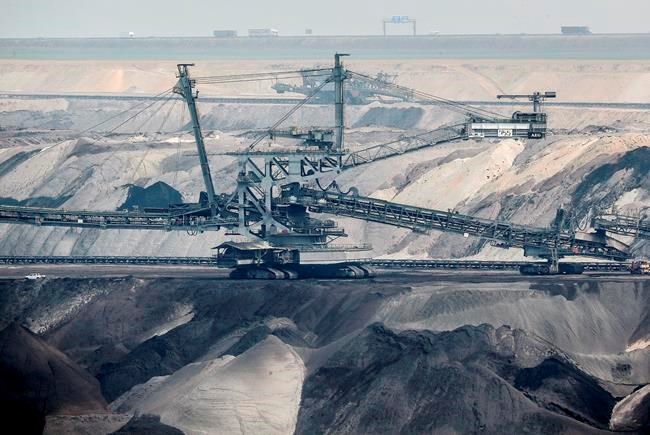Environmentalists say a report from the International Energy Agency that concludes investment in new fossil fuel sources must end if the world is to meet its climate goals has a strong message for Canada, but industry and government say the goal is too ambitious.
"We now have an analysis from the most authoritative energy body in the world that shows a direct link between a climate-safe future and a sharp decline in demand for oil and gas," said Chris Severson-Baker of the Pembina Institute, a clean-energy think tank.
"Within the decade, this will have a significant impact on the price and therefore production levels of oil and gas in Alberta."
The report, released Tuesday, says there is a narrow but viable pathway for a global energy sector with net-zero greenhouse gas emissions by 2050. It calls for an end to investment in new fossil fuel supplies and a fourfold increase in solar and wind power by 2030.
The Paris-based agency adds no new internal combustion engine passenger cars should be sold after 2035.
Several countries, including Canada and the United States, have pledged net-zero emissions by mid-century. That means only as much planet-warming gases would be released into the atmosphere as could be absorbed.
The report sets out 400 steps to transform energy production, transportation and use. Fatih Birol, the energy agency's executive director, said the change would create millions of new jobs and boost economic growth worldwide.
But he warned that greenhouse gas emissions continue to rise. The agency said last month that 2021 will see the second-largest annual increase in emissions since 2010.
“There is a growing gap between the rhetoric we hear from governments and industry leaders, and what is happening in real life,” Birol said.
The Canadian Association of Petroleum Producers called the report unrealistic.
"It is critical we remain grounded in the real world, where people need reliable and affordable energy to live," said director Tim McMillan.
Technology and innovation will provide those necessities as well as meet climate targets, he said.
Alberta Energy Minister Sonya Savage said her province is already doing much of what the report recommends to reduce the carbon footprint of its industry.
"Alberta's government is confident that our energy sector ... will continue to grow and thrive in the coming years. Forecasts for future world energy consumption, including those published by the IEA, predict oil and gas will continue to dominate the supply mix for the next several decades."
Federal Environment Minister Jonathan Wilkinson pointed to strategies, including creating clean-burning hydrogen from natural gas and storing the carbon dioxide underground.
"We are committed to making the progress to net zero," he said.
"There are a bunch of different ways to get there. We're going to have to make choices about which are the right ways for us."
Richard Masson of the University of Calgary said demand for fossil fuels in the next few years is expected to increase.
"The difference between what the IEA says we need to do and what we're actually going to do are night and day, because there's not a chance in the world we're hitting this path," said Masson with the School of Public Policy.
New-York-based energy analyst Phil Skolnick said no growth might not hurt the Canadian oilpatch since pipeline capacity issues have already forced companies to restrain expansion. Many oil producers plan to offset emissions with carbon capture and storage, a technology endorsed by the agency in its report.
Mark Jaccard, an energy economist at Simon Fraser University in British Columbia, said the agency's report confirms what other researchers have been saying for a decade.
"This is not a disaster for Alberta," he said. "Even in this climate-stabilizing scenario, oilsands output can be sustained at close to current levels for a couple of decades, provided that there are ongoing innovations and investments that reduce GHG production emissions."
Still, many said the agency's report only serves to emphasize big changes are in store for Canada's energy sector and those who regulate and invest in it.
"Alberta must take action to reduce emissions in the oil and gas sector to remain carbon-competitive as demand declines," Severson-Baker said. "This means attracting large-scale investments in decarbonization."
The Canada Energy Regulator and the country's financial sector — one of the most heavily exposed to fossil fuel development in the world — also face changes, said Adam Scott of Shift, an initiative that works to move investment into climate-friendly industries.
"The (agency's) definitive new outlook forces meaning into empty net-zero pledges made by governments, finance institutions and companies in recent years," he said.
"Financial decisions made today must assume a future where we are successful in achieving our climate goals. Continuing to make decisions based on the assumption of climate failure locks in that failure."
Greenpeace climate campaigner Keith Stewart called the report a "death blow" to any belief that Canada can increase production and reach its climate targets.
"It won't be easy, but the report shows that a zero-carbon world is better for our health, creates more jobs, has lower energy costs and is more equitable, while avoiding climate catastrophe."
— With files from Dan Healing and The Associated Press
This report by The Canadian Press was first published May 18, 2021.
Bob Weber, The Canadian Press
Note to readers: This is a corrected story. An earlier version referred to the Canadian Energy Regulator.



